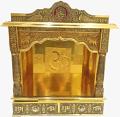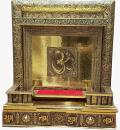New Arrivals
Puja Temple Mandir for Home w/ Doors & Hindu Carving 21" x 12"
|
Pooja Temple for home or office, this pooja mandir is beautiful blend of traditional aesthetics carving and ethnic design. Versatile Placement: Perfect for pooja rooms, living rooms, or any space where you want to infuse spirituality. Embrace and honor your cultural roots with a dedicated space to focus on your spiritual practices and connect with a higher power. Enhance Home Decor: Exquisite Craftsmanship: Meticulously crafted with intricate details. Size : 21" X 12" |
$325.00
$308.00
5% OffTraditional Puja Mandir Temple w/ Doors GERMAN OXIDIZED TEMPLE 24" x 9"
|
Pooja Temple for home big size, pooja mandir is a beautiful blend of traditional aesthetics and timeless design. Versatile Placement: Perfect for pooja rooms, living rooms, or any space where you want to infuse spirituality. Embrace and honor your cultural roots with a dedicated space to focus on your spiritual practices and connect with a higher power. Enhance Home Decor: Exquisite Craftsmanship: Meticulously crafted with intricate details. size 24" * 9" |
$299.00
$272.00
9% OffGolden Oxidized Puja Mandir Temple for Home w/ Carving 24" * 9"
|
Bring home this beautiful golden oxidized Pooja Temple with intricate carving in blend of traditional aesthetics and timeless design. Versatile Placement: Perfect for pooja rooms, living rooms, or any space where you want to infuse spirituality. Embrace and honor your cultural roots with a dedicated space to focus on your spiritual practices and connect with a higher power. Enhance Home Decor: Exquisite Craftsmanship: Meticulously crafted with intricate detail. size: 24" * 9" |
$390.00
$350.00
10% OffIntricate Carving Golden Oxidized Open Style Mandir for Home 21" x 9"
|
Pooja Temple for home big size, pooja mandir is a beautiful blend of traditional aesthetics and timeless design. Versatile Placement: Perfect for pooja rooms, living rooms, or any space where you want to infuse spirituality. Embrace and honor your cultural roots with a dedicated space to focus on your spiritual practices and connect with a higher power. Enhance Home Decor: Exquisite Craftsmanship: Meticulously crafted with intricate details size: 21" * 9" |
$355.00
$330.50
7% OffGerman Oxidized Carved Puja Mandir Temple for Home 18" x 9"
|
Pooja Temple for home big size, pooja mandir is a beautiful blend of traditional aesthetics and timeless design. Versatile Placement: Perfect for pooja rooms, living rooms, or any space where you want to infuse spirituality. Embrace and honor your cultural roots with a dedicated space to focus on your spiritual practices and connect with a higher power. Enhance Home Decor: Exquisite Craftsmanship: Meticulously crafted with intricate details Size 18" * 9" |
$250.00
$221.00
12% OffSmall Open Style Carved Oxidized Mandir Temple for Home 15" x 7"
|
Pooja Temple for home small size, pooja mandir is a beautiful blend of traditional aesthetics and timeless design. Versatile Placement: Perfect for pooja rooms, living rooms, or any space where you want to infuse spirituality. Embrace and honor your cultural roots with a dedicated space to focus on your spiritual practices and connect with a higher power. Enhance Home Decor: Exquisite Craftsmanship: Meticulously crafted with intricate details Size: 15" * 7" |
$195.00
$163.00
16% OffTemple Mandir GOLDEN OXIDIZE TEMPLE OPEN Size 21*9
|
Pooja Temple for home big size, pooja mandir is a beautiful blend of traditional aesthetics and timeless design. Versatile Placement: Perfect for pooja rooms, living rooms, or any space where you want to infuse spirituality. Embrace and honor your cultural roots with a dedicated space to focus on your spiritual practices and connect with a higher power. Enhance Home Decor: Exquisite Craftsmanship: Meticulously crafted with intricate details Size : 21*9 inch |
$325.00
$298.50
8% OffPuja Temple Mandir , Oxidized w/ Copper Trim & Carving 24" x 9"
|
Pooja Temple for home big size, pooja mandir is a beautiful blend of traditional aesthetics and timeless design. Versatile Placement: Perfect for pooja rooms, living rooms, or any space where you want to infuse spirituality. Embrace and honor your cultural roots with a dedicated space to focus on your spiritual practices and connect with a higher power. Enhance Home Decor: Exquisite Craftsmanship: Meticulously crafted with intricate details Size: 24 * 9 (inches) |
$299.00
$271.99
9% OffIntricately Carved Oxidized Puja Mandir w/ Doors for Home 24" x 9"
|
Intricately carved oxidized Pooja Temple for home big size, pooja mandir is a beautiful blend of traditional aesthetics and timeless design. Versatile Placement: Perfect for pooja rooms, living rooms, or any space where you want to infuse spirituality. Embrace and honor your cultural roots with a dedicated space to focus on your spiritual practices and connect with a higher power. Enhance Home Decor: Exquisite Craftsmanship: Meticulously crafted with intricate details. Size :24 * 9 inches |
$299.00
$271.99
9% OffTulsi kyara Carving Terracotta Clay Holi Basil Tulsi Planter 11.5"
|
Natural Clay Holy Basil Tulsi Planter Clay / - Tusli Kiara - 9 x 9 x 11.5 The auspicious symbol for prosperity, growth and happiness It is considered as household god particularly referred as a “Women's deity”. It is called as “the central sectarian symbol of Hinduism” and Vaishavas consider it as “the manifestation of god in the vegetable kingdom”. |
$25.00
wood Holy Book Stand Holder ( Pooja & Festival /Pooja Store)
|
COMFORTABLE POSITION : Hands free Eye level viewing for optimum posture and comfortable neck position.X-shaped foldable book rest used for placing holy books during recitation. Due to the elevated platform, you do not need to place the holy books on your lap or floor while you read to keep all holy books with respect and your body posture remains upright. Sizes : Close & Open (Length x height))Small : 6.75 x 13 & 11.75 x 6.5 ( Big : 7.5 x 15 & 15 x 7 |
$18.00
Nag Champa Incense Bulk Agarbatti - 6 Packs X 100g Each (600g)
|
One of the best selling incense sticks around the world, Satya Sai Baba Nag Champa agarbatti sticks *Price includes 6 packs of 100g each - total 600g If you are looking to buy Nag Champa Incense in bulk online, please reach out to us for wholesale pricing. |
$44.95
Significance of Pooja in Hindu Religion
Why Hindus do Pooja?Hinduism is a religion which values worship or ‘Pooja’. This is precisely why every individual who practices the Hindu faith engages in daily morning prayers as a symbol of surrendering one’s body, mind, soul, desires, actions, thoughts and time to God. Blessings are sought each morning because it is considered as the best way to start off a new day.Everyday worship and special occasionsThis daily ritual generally takes place at one’s home, however on special occasions that are either considered auspicious or have a significant meaning in the lives of individuals, worshipping in a pooja mandir is the norm. At home individuals and families worship in a specially assigned space where religious iconology and other sacred items are placed, whereas at temples individuals and families worship alongside priests. Priests lead the process of worship and are usually the ones chanting the invocatory incantations.Birthdays, anniversaries and significant new ventures are some of the occasions when families collectively visit temples to offer prayers to the form of divinity they believe in and respect most. A pooja or worship session follows a particular structure that is believed to yield positive results when followed to a precision. Elaborate and complex prayers are offered by priests on behalf of families within their home or at a temple.
Worship of hindu god statuesHindus worship idols and often place small to medium sized idols of various gods and goddesses in the specially assigned Pooja space within their homes. However, the Hindu god statues present in temples are magnanimous and grand and several feet tall. These statues are where gods reside hence; they are treated accordingly and are adorned, offered prasad (food offerings), dhupam (incense), deep (small oil lamps), flowers and many other pooja items (also known as puja samagri).Hindu individuals believe that achieving the blessings of their much loved gods becomes easier by regularly worshipping them daily as daily prayers help establish a direct link between devotee and divinity. Additionally, all senses of the human body are engaged in prayer which is why daily worship is considered a state of total surrender. Many believe that Gods bestow upon them their blessings directly and remove the impurities that have accumulated in their minds and bodies through wrongdoings. Pooja is certainly a way of asking forgiveness of the almighty.
Varying hindu ritualsHindus belong to various castes, sub castes, communities and sects and no two of the aforementioned categories perform the same ritual in the same manner. The variations may be subtle but are certainly noticeable. Traditions and rituals pertaining to worship also vary from one community to the other. |
















